Emotional Intelligence in the Workplace: Measuring and Developing EQ for Recruitment and Promotion
VerifiedAdded on 2023/06/03
|14
|3226
|230
AI Summary
This report discusses emotional intelligence in the workplace, its effects on interpersonal skills and organizational effectiveness, and ways to measure and develop it. It also explores how emotional intelligence can be used for recruitment and promotion. The report highlights the importance of self-awareness, motivation, empathy, and people skills in measuring emotional intelligence.
Contribute Materials
Your contribution can guide someone’s learning journey. Share your
documents today.
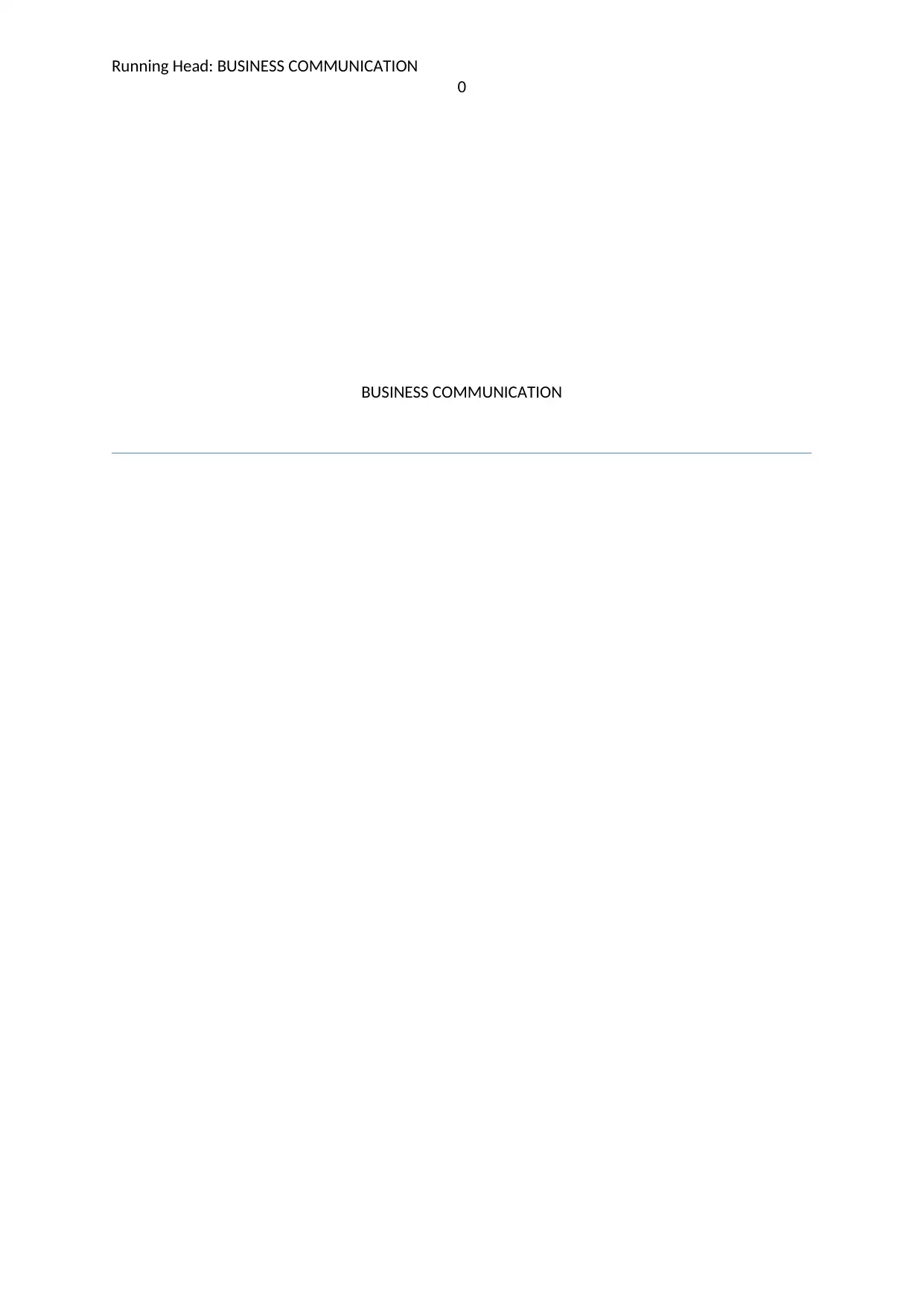
Running Head: BUSINESS COMMUNICATION
0
BUSINESS COMMUNICATION
0
BUSINESS COMMUNICATION
Secure Best Marks with AI Grader
Need help grading? Try our AI Grader for instant feedback on your assignments.
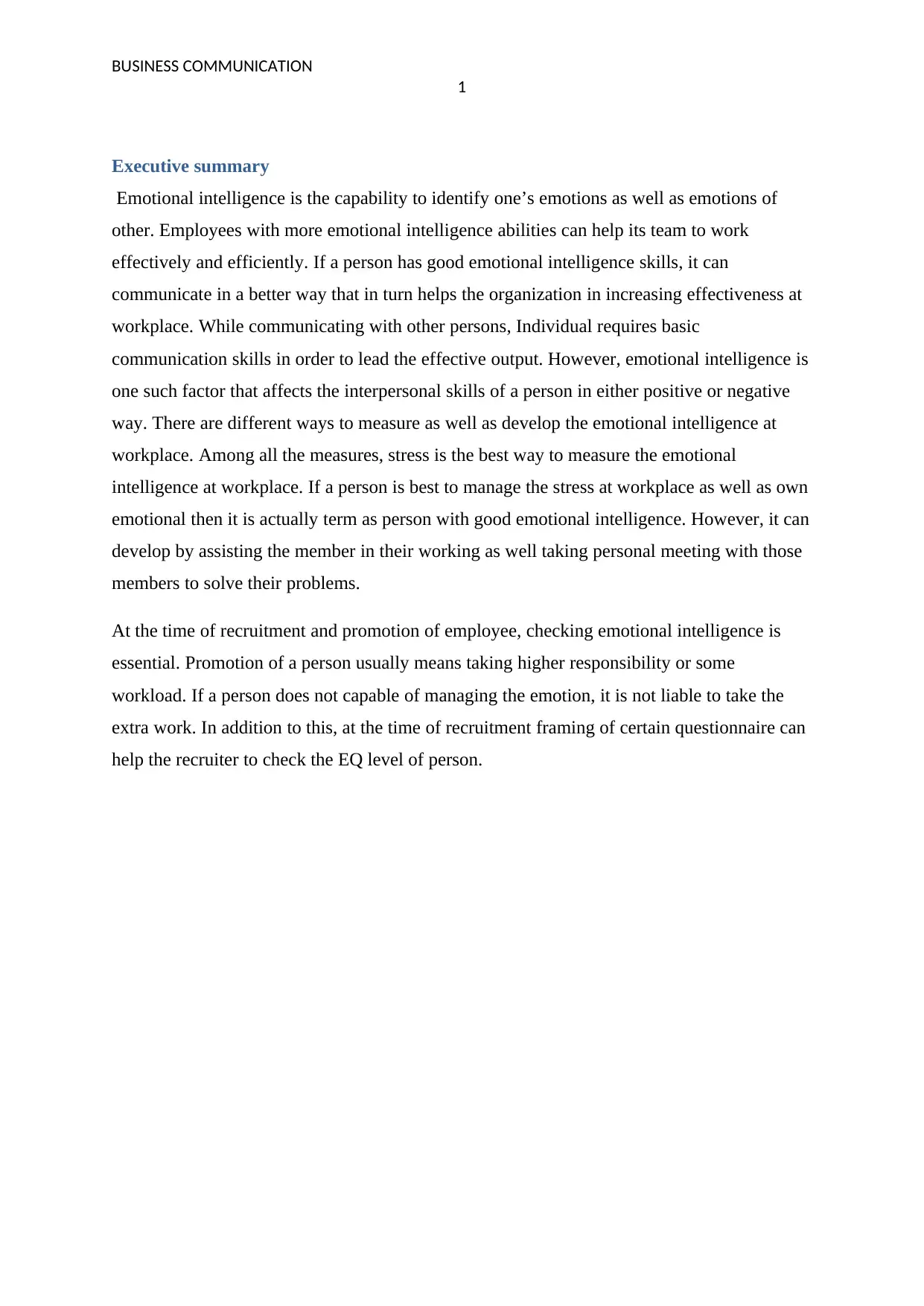
BUSINESS COMMUNICATION
1
Executive summary
Emotional intelligence is the capability to identify one’s emotions as well as emotions of
other. Employees with more emotional intelligence abilities can help its team to work
effectively and efficiently. If a person has good emotional intelligence skills, it can
communicate in a better way that in turn helps the organization in increasing effectiveness at
workplace. While communicating with other persons, Individual requires basic
communication skills in order to lead the effective output. However, emotional intelligence is
one such factor that affects the interpersonal skills of a person in either positive or negative
way. There are different ways to measure as well as develop the emotional intelligence at
workplace. Among all the measures, stress is the best way to measure the emotional
intelligence at workplace. If a person is best to manage the stress at workplace as well as own
emotional then it is actually term as person with good emotional intelligence. However, it can
develop by assisting the member in their working as well taking personal meeting with those
members to solve their problems.
At the time of recruitment and promotion of employee, checking emotional intelligence is
essential. Promotion of a person usually means taking higher responsibility or some
workload. If a person does not capable of managing the emotion, it is not liable to take the
extra work. In addition to this, at the time of recruitment framing of certain questionnaire can
help the recruiter to check the EQ level of person.
1
Executive summary
Emotional intelligence is the capability to identify one’s emotions as well as emotions of
other. Employees with more emotional intelligence abilities can help its team to work
effectively and efficiently. If a person has good emotional intelligence skills, it can
communicate in a better way that in turn helps the organization in increasing effectiveness at
workplace. While communicating with other persons, Individual requires basic
communication skills in order to lead the effective output. However, emotional intelligence is
one such factor that affects the interpersonal skills of a person in either positive or negative
way. There are different ways to measure as well as develop the emotional intelligence at
workplace. Among all the measures, stress is the best way to measure the emotional
intelligence at workplace. If a person is best to manage the stress at workplace as well as own
emotional then it is actually term as person with good emotional intelligence. However, it can
develop by assisting the member in their working as well taking personal meeting with those
members to solve their problems.
At the time of recruitment and promotion of employee, checking emotional intelligence is
essential. Promotion of a person usually means taking higher responsibility or some
workload. If a person does not capable of managing the emotion, it is not liable to take the
extra work. In addition to this, at the time of recruitment framing of certain questionnaire can
help the recruiter to check the EQ level of person.
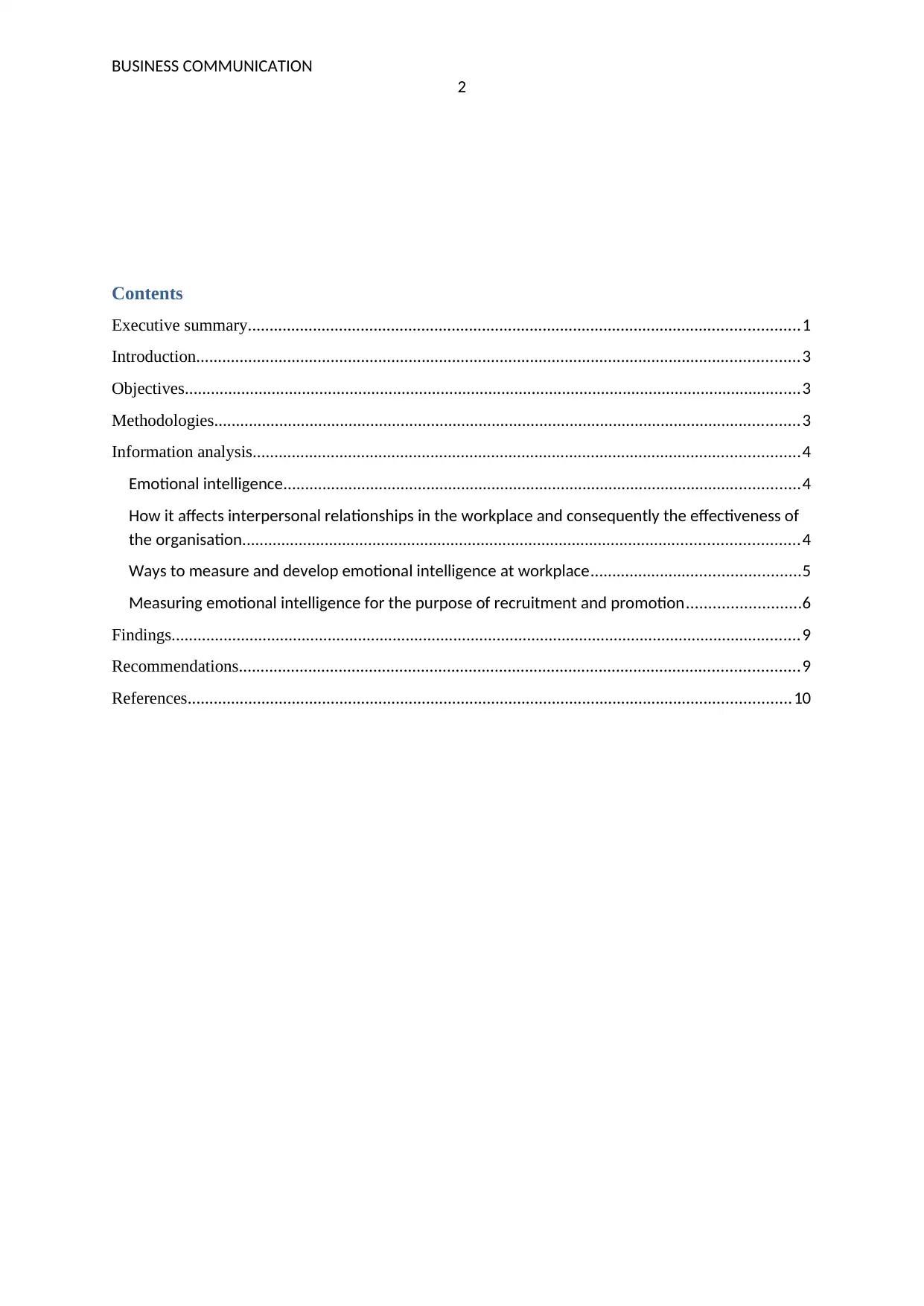
BUSINESS COMMUNICATION
2
Contents
Executive summary...............................................................................................................................1
Introduction...........................................................................................................................................3
Objectives..............................................................................................................................................3
Methodologies.......................................................................................................................................3
Information analysis..............................................................................................................................4
Emotional intelligence.......................................................................................................................4
How it affects interpersonal relationships in the workplace and consequently the effectiveness of
the organisation................................................................................................................................4
Ways to measure and develop emotional intelligence at workplace................................................5
Measuring emotional intelligence for the purpose of recruitment and promotion..........................6
Findings.................................................................................................................................................9
Recommendations.................................................................................................................................9
References...........................................................................................................................................10
2
Contents
Executive summary...............................................................................................................................1
Introduction...........................................................................................................................................3
Objectives..............................................................................................................................................3
Methodologies.......................................................................................................................................3
Information analysis..............................................................................................................................4
Emotional intelligence.......................................................................................................................4
How it affects interpersonal relationships in the workplace and consequently the effectiveness of
the organisation................................................................................................................................4
Ways to measure and develop emotional intelligence at workplace................................................5
Measuring emotional intelligence for the purpose of recruitment and promotion..........................6
Findings.................................................................................................................................................9
Recommendations.................................................................................................................................9
References...........................................................................................................................................10
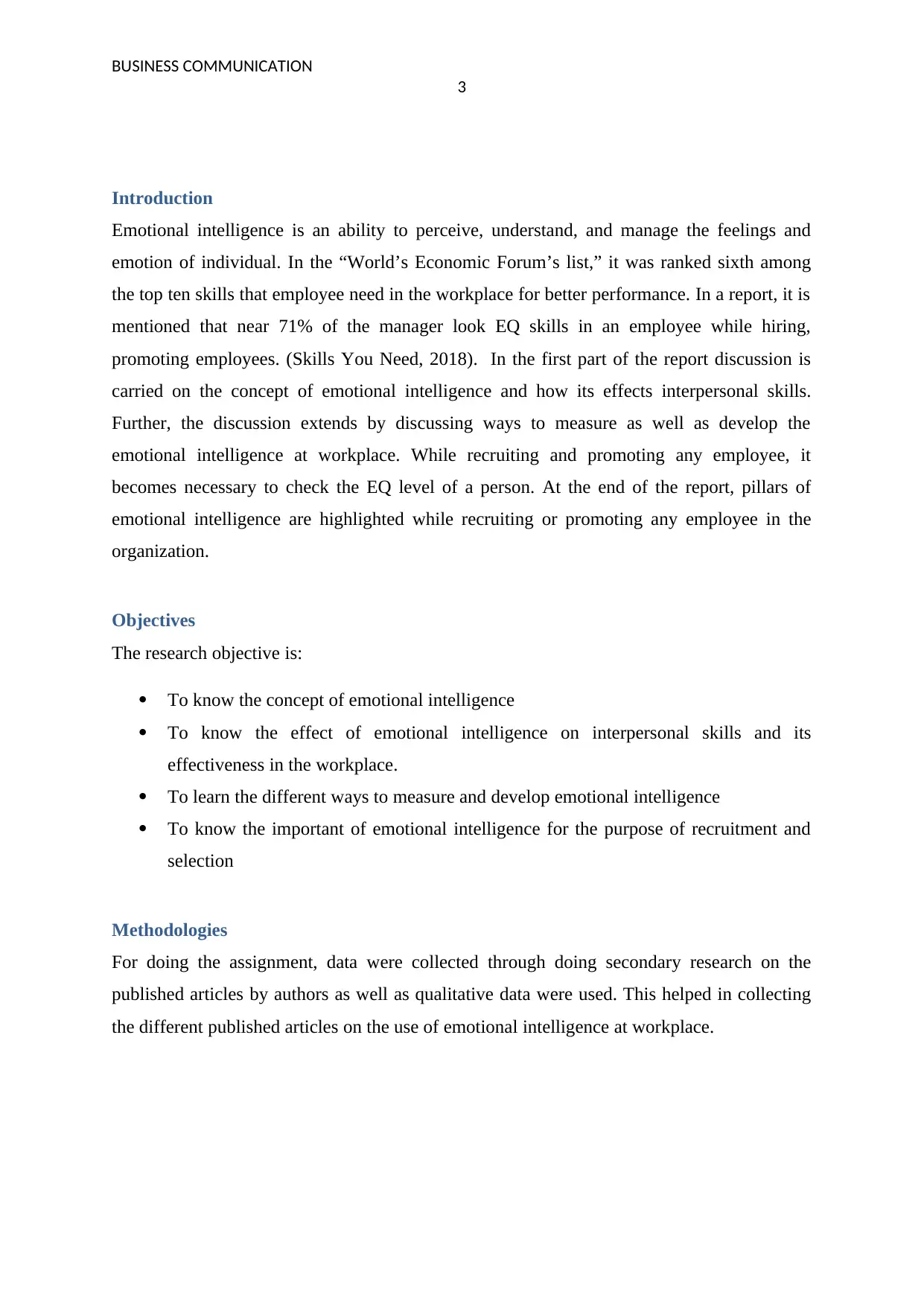
BUSINESS COMMUNICATION
3
Introduction
Emotional intelligence is an ability to perceive, understand, and manage the feelings and
emotion of individual. In the “World’s Economic Forum’s list,” it was ranked sixth among
the top ten skills that employee need in the workplace for better performance. In a report, it is
mentioned that near 71% of the manager look EQ skills in an employee while hiring,
promoting employees. (Skills You Need, 2018). In the first part of the report discussion is
carried on the concept of emotional intelligence and how its effects interpersonal skills.
Further, the discussion extends by discussing ways to measure as well as develop the
emotional intelligence at workplace. While recruiting and promoting any employee, it
becomes necessary to check the EQ level of a person. At the end of the report, pillars of
emotional intelligence are highlighted while recruiting or promoting any employee in the
organization.
Objectives
The research objective is:
To know the concept of emotional intelligence
To know the effect of emotional intelligence on interpersonal skills and its
effectiveness in the workplace.
To learn the different ways to measure and develop emotional intelligence
To know the important of emotional intelligence for the purpose of recruitment and
selection
Methodologies
For doing the assignment, data were collected through doing secondary research on the
published articles by authors as well as qualitative data were used. This helped in collecting
the different published articles on the use of emotional intelligence at workplace.
3
Introduction
Emotional intelligence is an ability to perceive, understand, and manage the feelings and
emotion of individual. In the “World’s Economic Forum’s list,” it was ranked sixth among
the top ten skills that employee need in the workplace for better performance. In a report, it is
mentioned that near 71% of the manager look EQ skills in an employee while hiring,
promoting employees. (Skills You Need, 2018). In the first part of the report discussion is
carried on the concept of emotional intelligence and how its effects interpersonal skills.
Further, the discussion extends by discussing ways to measure as well as develop the
emotional intelligence at workplace. While recruiting and promoting any employee, it
becomes necessary to check the EQ level of a person. At the end of the report, pillars of
emotional intelligence are highlighted while recruiting or promoting any employee in the
organization.
Objectives
The research objective is:
To know the concept of emotional intelligence
To know the effect of emotional intelligence on interpersonal skills and its
effectiveness in the workplace.
To learn the different ways to measure and develop emotional intelligence
To know the important of emotional intelligence for the purpose of recruitment and
selection
Methodologies
For doing the assignment, data were collected through doing secondary research on the
published articles by authors as well as qualitative data were used. This helped in collecting
the different published articles on the use of emotional intelligence at workplace.
Secure Best Marks with AI Grader
Need help grading? Try our AI Grader for instant feedback on your assignments.
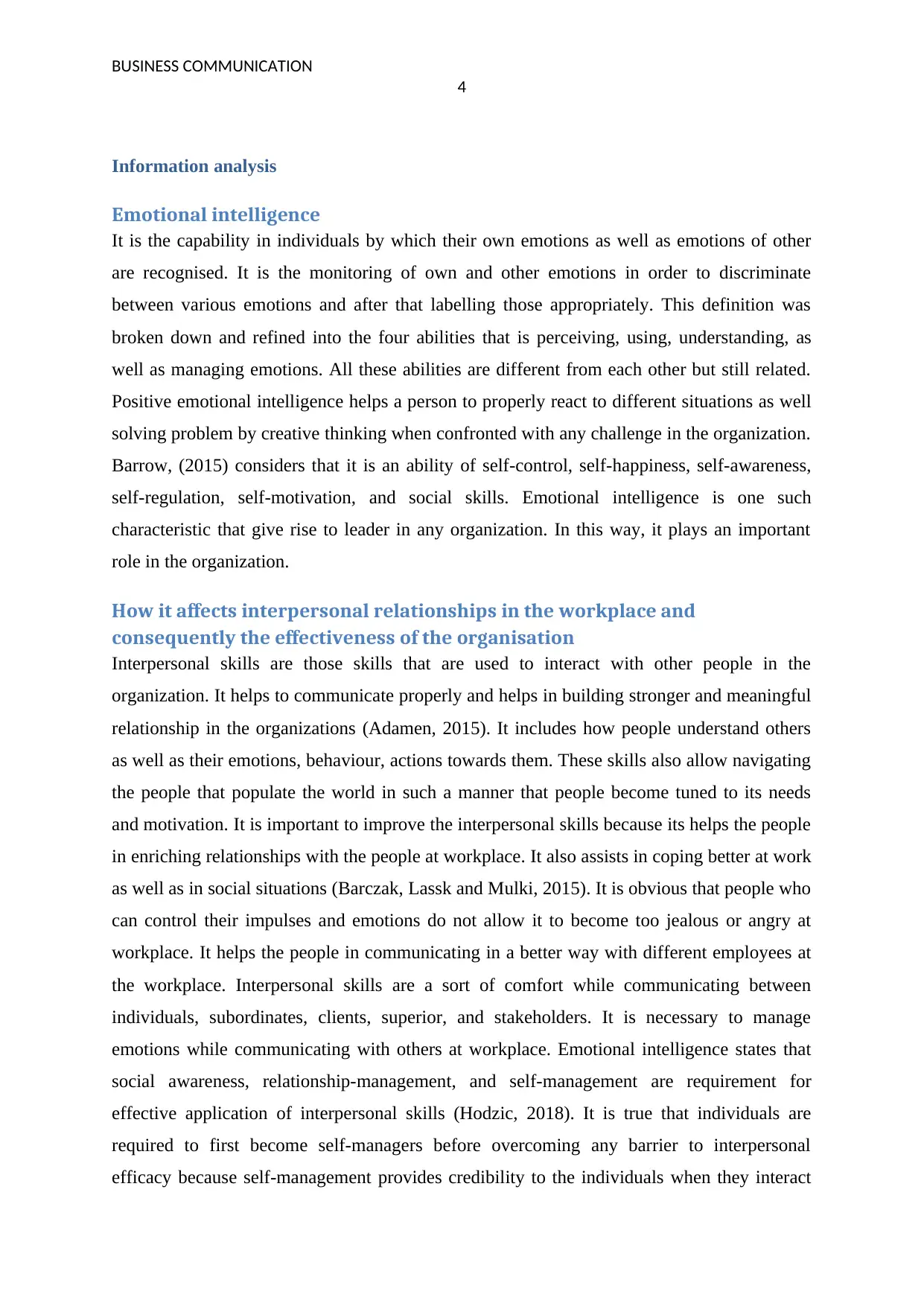
BUSINESS COMMUNICATION
4
Information analysis
Emotional intelligence
It is the capability in individuals by which their own emotions as well as emotions of other
are recognised. It is the monitoring of own and other emotions in order to discriminate
between various emotions and after that labelling those appropriately. This definition was
broken down and refined into the four abilities that is perceiving, using, understanding, as
well as managing emotions. All these abilities are different from each other but still related.
Positive emotional intelligence helps a person to properly react to different situations as well
solving problem by creative thinking when confronted with any challenge in the organization.
Barrow, (2015) considers that it is an ability of self-control, self-happiness, self-awareness,
self-regulation, self-motivation, and social skills. Emotional intelligence is one such
characteristic that give rise to leader in any organization. In this way, it plays an important
role in the organization.
How it affects interpersonal relationships in the workplace and
consequently the effectiveness of the organisation
Interpersonal skills are those skills that are used to interact with other people in the
organization. It helps to communicate properly and helps in building stronger and meaningful
relationship in the organizations (Adamen, 2015). It includes how people understand others
as well as their emotions, behaviour, actions towards them. These skills also allow navigating
the people that populate the world in such a manner that people become tuned to its needs
and motivation. It is important to improve the interpersonal skills because its helps the people
in enriching relationships with the people at workplace. It also assists in coping better at work
as well as in social situations (Barczak, Lassk and Mulki, 2015). It is obvious that people who
can control their impulses and emotions do not allow it to become too jealous or angry at
workplace. It helps the people in communicating in a better way with different employees at
the workplace. Interpersonal skills are a sort of comfort while communicating between
individuals, subordinates, clients, superior, and stakeholders. It is necessary to manage
emotions while communicating with others at workplace. Emotional intelligence states that
social awareness, relationship-management, and self-management are requirement for
effective application of interpersonal skills (Hodzic, 2018). It is true that individuals are
required to first become self-managers before overcoming any barrier to interpersonal
efficacy because self-management provides credibility to the individuals when they interact
4
Information analysis
Emotional intelligence
It is the capability in individuals by which their own emotions as well as emotions of other
are recognised. It is the monitoring of own and other emotions in order to discriminate
between various emotions and after that labelling those appropriately. This definition was
broken down and refined into the four abilities that is perceiving, using, understanding, as
well as managing emotions. All these abilities are different from each other but still related.
Positive emotional intelligence helps a person to properly react to different situations as well
solving problem by creative thinking when confronted with any challenge in the organization.
Barrow, (2015) considers that it is an ability of self-control, self-happiness, self-awareness,
self-regulation, self-motivation, and social skills. Emotional intelligence is one such
characteristic that give rise to leader in any organization. In this way, it plays an important
role in the organization.
How it affects interpersonal relationships in the workplace and
consequently the effectiveness of the organisation
Interpersonal skills are those skills that are used to interact with other people in the
organization. It helps to communicate properly and helps in building stronger and meaningful
relationship in the organizations (Adamen, 2015). It includes how people understand others
as well as their emotions, behaviour, actions towards them. These skills also allow navigating
the people that populate the world in such a manner that people become tuned to its needs
and motivation. It is important to improve the interpersonal skills because its helps the people
in enriching relationships with the people at workplace. It also assists in coping better at work
as well as in social situations (Barczak, Lassk and Mulki, 2015). It is obvious that people who
can control their impulses and emotions do not allow it to become too jealous or angry at
workplace. It helps the people in communicating in a better way with different employees at
the workplace. Interpersonal skills are a sort of comfort while communicating between
individuals, subordinates, clients, superior, and stakeholders. It is necessary to manage
emotions while communicating with others at workplace. Emotional intelligence states that
social awareness, relationship-management, and self-management are requirement for
effective application of interpersonal skills (Hodzic, 2018). It is true that individuals are
required to first become self-managers before overcoming any barrier to interpersonal
efficacy because self-management provides credibility to the individuals when they interact
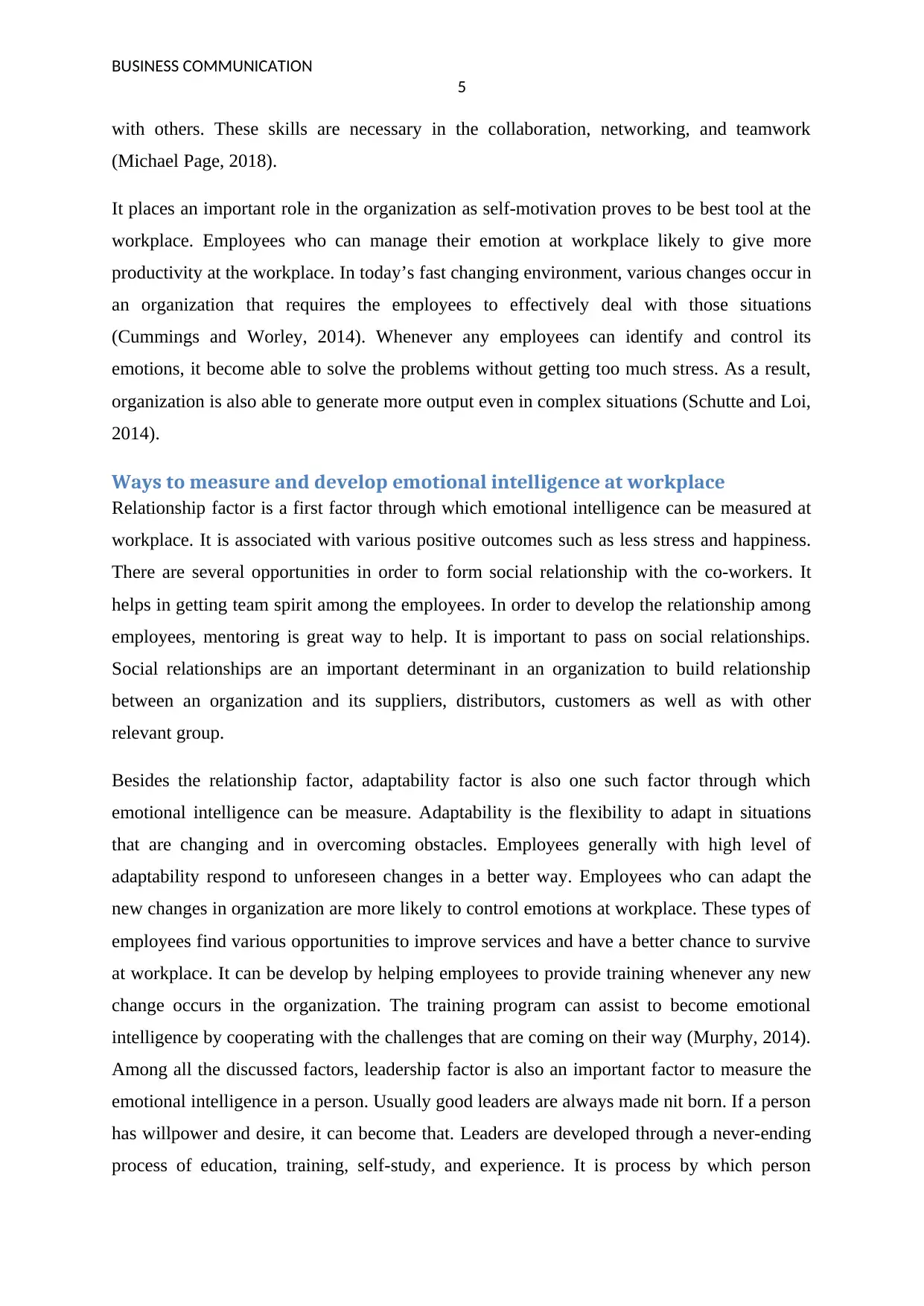
BUSINESS COMMUNICATION
5
with others. These skills are necessary in the collaboration, networking, and teamwork
(Michael Page, 2018).
It places an important role in the organization as self-motivation proves to be best tool at the
workplace. Employees who can manage their emotion at workplace likely to give more
productivity at the workplace. In today’s fast changing environment, various changes occur in
an organization that requires the employees to effectively deal with those situations
(Cummings and Worley, 2014). Whenever any employees can identify and control its
emotions, it become able to solve the problems without getting too much stress. As a result,
organization is also able to generate more output even in complex situations (Schutte and Loi,
2014).
Ways to measure and develop emotional intelligence at workplace
Relationship factor is a first factor through which emotional intelligence can be measured at
workplace. It is associated with various positive outcomes such as less stress and happiness.
There are several opportunities in order to form social relationship with the co-workers. It
helps in getting team spirit among the employees. In order to develop the relationship among
employees, mentoring is great way to help. It is important to pass on social relationships.
Social relationships are an important determinant in an organization to build relationship
between an organization and its suppliers, distributors, customers as well as with other
relevant group.
Besides the relationship factor, adaptability factor is also one such factor through which
emotional intelligence can be measure. Adaptability is the flexibility to adapt in situations
that are changing and in overcoming obstacles. Employees generally with high level of
adaptability respond to unforeseen changes in a better way. Employees who can adapt the
new changes in organization are more likely to control emotions at workplace. These types of
employees find various opportunities to improve services and have a better chance to survive
at workplace. It can be develop by helping employees to provide training whenever any new
change occurs in the organization. The training program can assist to become emotional
intelligence by cooperating with the challenges that are coming on their way (Murphy, 2014).
Among all the discussed factors, leadership factor is also an important factor to measure the
emotional intelligence in a person. Usually good leaders are always made nit born. If a person
has willpower and desire, it can become that. Leaders are developed through a never-ending
process of education, training, self-study, and experience. It is process by which person
5
with others. These skills are necessary in the collaboration, networking, and teamwork
(Michael Page, 2018).
It places an important role in the organization as self-motivation proves to be best tool at the
workplace. Employees who can manage their emotion at workplace likely to give more
productivity at the workplace. In today’s fast changing environment, various changes occur in
an organization that requires the employees to effectively deal with those situations
(Cummings and Worley, 2014). Whenever any employees can identify and control its
emotions, it become able to solve the problems without getting too much stress. As a result,
organization is also able to generate more output even in complex situations (Schutte and Loi,
2014).
Ways to measure and develop emotional intelligence at workplace
Relationship factor is a first factor through which emotional intelligence can be measured at
workplace. It is associated with various positive outcomes such as less stress and happiness.
There are several opportunities in order to form social relationship with the co-workers. It
helps in getting team spirit among the employees. In order to develop the relationship among
employees, mentoring is great way to help. It is important to pass on social relationships.
Social relationships are an important determinant in an organization to build relationship
between an organization and its suppliers, distributors, customers as well as with other
relevant group.
Besides the relationship factor, adaptability factor is also one such factor through which
emotional intelligence can be measure. Adaptability is the flexibility to adapt in situations
that are changing and in overcoming obstacles. Employees generally with high level of
adaptability respond to unforeseen changes in a better way. Employees who can adapt the
new changes in organization are more likely to control emotions at workplace. These types of
employees find various opportunities to improve services and have a better chance to survive
at workplace. It can be develop by helping employees to provide training whenever any new
change occurs in the organization. The training program can assist to become emotional
intelligence by cooperating with the challenges that are coming on their way (Murphy, 2014).
Among all the discussed factors, leadership factor is also an important factor to measure the
emotional intelligence in a person. Usually good leaders are always made nit born. If a person
has willpower and desire, it can become that. Leaders are developed through a never-ending
process of education, training, self-study, and experience. It is process by which person
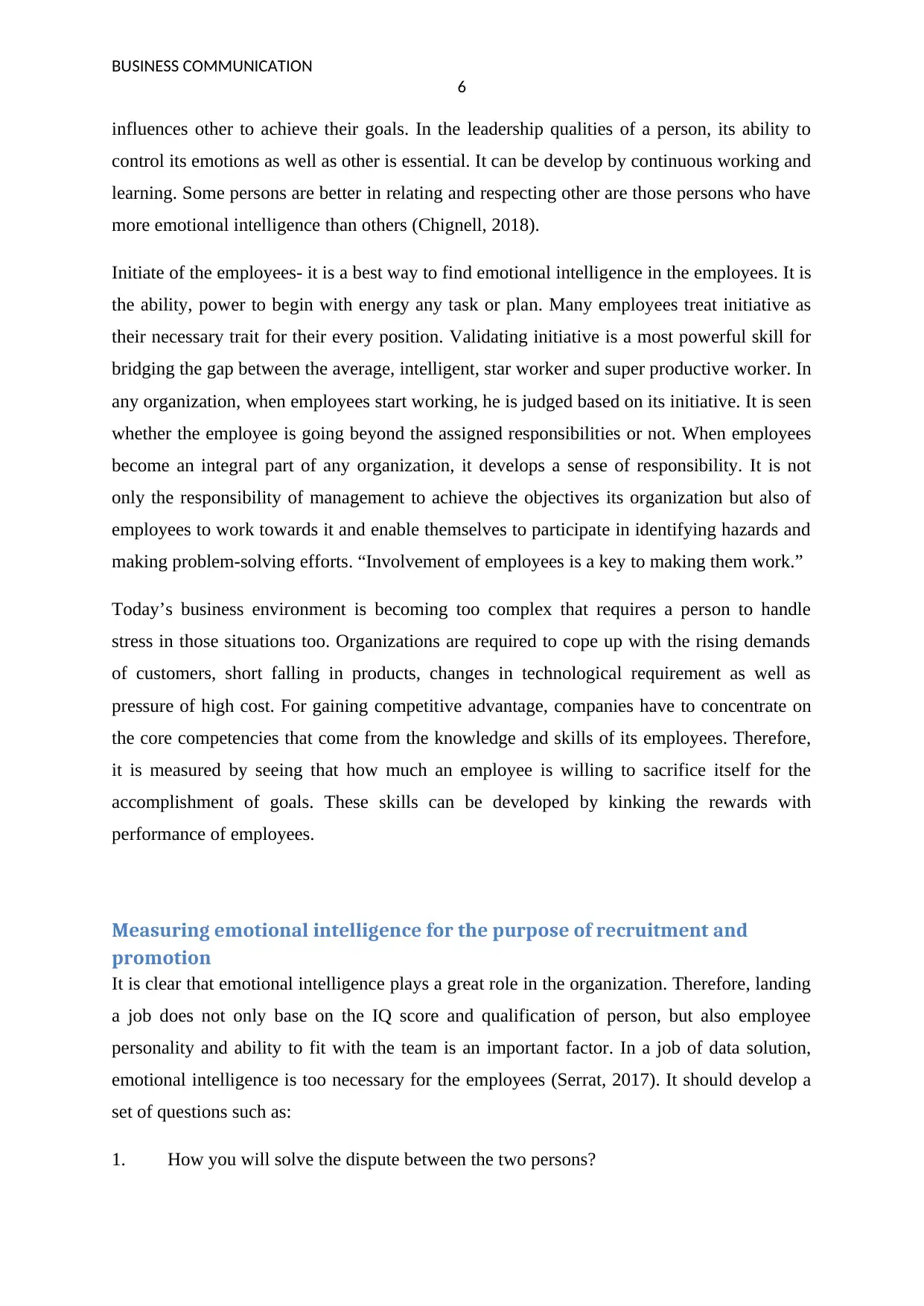
BUSINESS COMMUNICATION
6
influences other to achieve their goals. In the leadership qualities of a person, its ability to
control its emotions as well as other is essential. It can be develop by continuous working and
learning. Some persons are better in relating and respecting other are those persons who have
more emotional intelligence than others (Chignell, 2018).
Initiate of the employees- it is a best way to find emotional intelligence in the employees. It is
the ability, power to begin with energy any task or plan. Many employees treat initiative as
their necessary trait for their every position. Validating initiative is a most powerful skill for
bridging the gap between the average, intelligent, star worker and super productive worker. In
any organization, when employees start working, he is judged based on its initiative. It is seen
whether the employee is going beyond the assigned responsibilities or not. When employees
become an integral part of any organization, it develops a sense of responsibility. It is not
only the responsibility of management to achieve the objectives its organization but also of
employees to work towards it and enable themselves to participate in identifying hazards and
making problem-solving efforts. “Involvement of employees is a key to making them work.”
Today’s business environment is becoming too complex that requires a person to handle
stress in those situations too. Organizations are required to cope up with the rising demands
of customers, short falling in products, changes in technological requirement as well as
pressure of high cost. For gaining competitive advantage, companies have to concentrate on
the core competencies that come from the knowledge and skills of its employees. Therefore,
it is measured by seeing that how much an employee is willing to sacrifice itself for the
accomplishment of goals. These skills can be developed by kinking the rewards with
performance of employees.
Measuring emotional intelligence for the purpose of recruitment and
promotion
It is clear that emotional intelligence plays a great role in the organization. Therefore, landing
a job does not only base on the IQ score and qualification of person, but also employee
personality and ability to fit with the team is an important factor. In a job of data solution,
emotional intelligence is too necessary for the employees (Serrat, 2017). It should develop a
set of questions such as:
1. How you will solve the dispute between the two persons?
6
influences other to achieve their goals. In the leadership qualities of a person, its ability to
control its emotions as well as other is essential. It can be develop by continuous working and
learning. Some persons are better in relating and respecting other are those persons who have
more emotional intelligence than others (Chignell, 2018).
Initiate of the employees- it is a best way to find emotional intelligence in the employees. It is
the ability, power to begin with energy any task or plan. Many employees treat initiative as
their necessary trait for their every position. Validating initiative is a most powerful skill for
bridging the gap between the average, intelligent, star worker and super productive worker. In
any organization, when employees start working, he is judged based on its initiative. It is seen
whether the employee is going beyond the assigned responsibilities or not. When employees
become an integral part of any organization, it develops a sense of responsibility. It is not
only the responsibility of management to achieve the objectives its organization but also of
employees to work towards it and enable themselves to participate in identifying hazards and
making problem-solving efforts. “Involvement of employees is a key to making them work.”
Today’s business environment is becoming too complex that requires a person to handle
stress in those situations too. Organizations are required to cope up with the rising demands
of customers, short falling in products, changes in technological requirement as well as
pressure of high cost. For gaining competitive advantage, companies have to concentrate on
the core competencies that come from the knowledge and skills of its employees. Therefore,
it is measured by seeing that how much an employee is willing to sacrifice itself for the
accomplishment of goals. These skills can be developed by kinking the rewards with
performance of employees.
Measuring emotional intelligence for the purpose of recruitment and
promotion
It is clear that emotional intelligence plays a great role in the organization. Therefore, landing
a job does not only base on the IQ score and qualification of person, but also employee
personality and ability to fit with the team is an important factor. In a job of data solution,
emotional intelligence is too necessary for the employees (Serrat, 2017). It should develop a
set of questions such as:
1. How you will solve the dispute between the two persons?
Paraphrase This Document
Need a fresh take? Get an instant paraphrase of this document with our AI Paraphraser
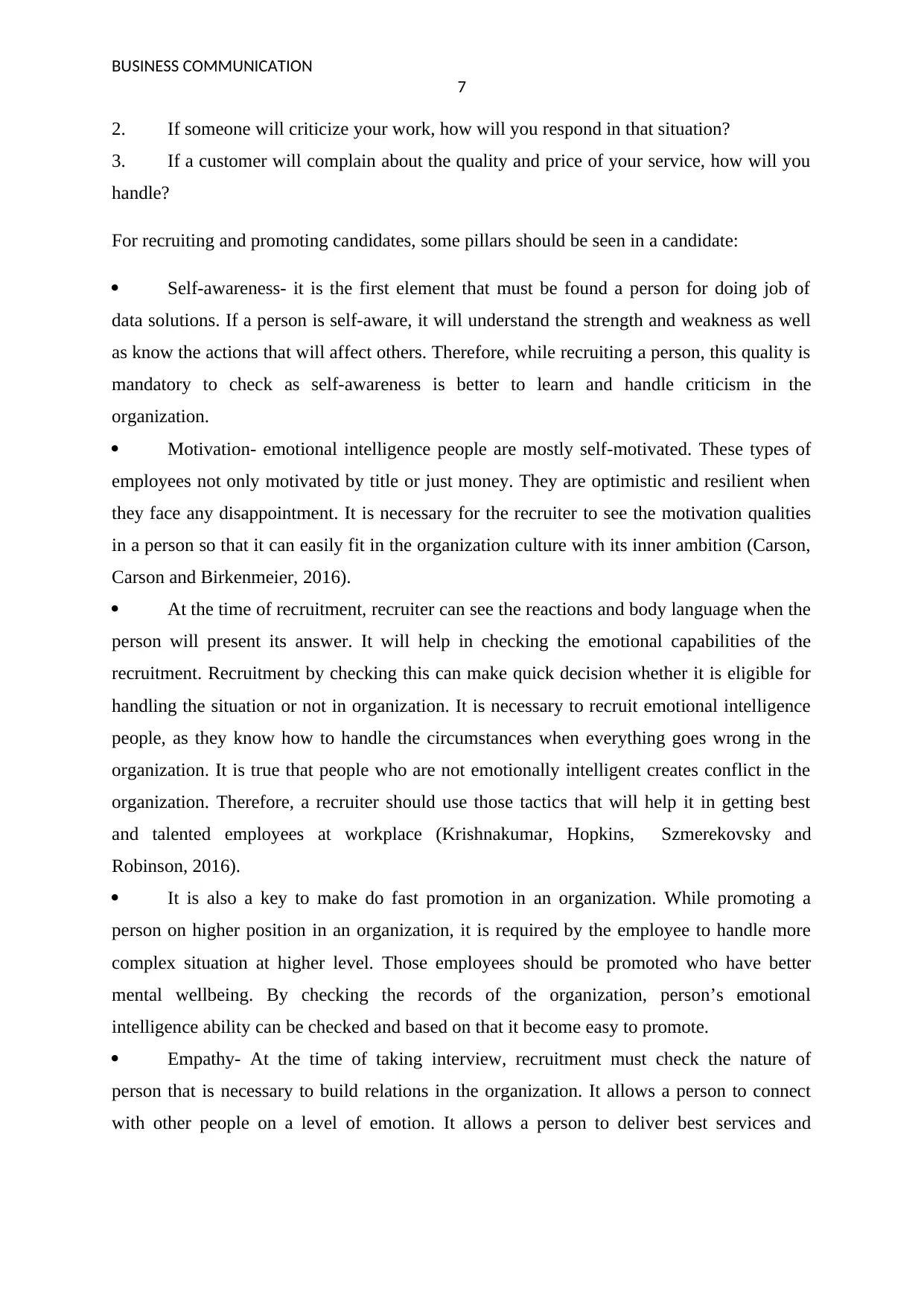
BUSINESS COMMUNICATION
7
2. If someone will criticize your work, how will you respond in that situation?
3. If a customer will complain about the quality and price of your service, how will you
handle?
For recruiting and promoting candidates, some pillars should be seen in a candidate:
Self-awareness- it is the first element that must be found a person for doing job of
data solutions. If a person is self-aware, it will understand the strength and weakness as well
as know the actions that will affect others. Therefore, while recruiting a person, this quality is
mandatory to check as self-awareness is better to learn and handle criticism in the
organization.
Motivation- emotional intelligence people are mostly self-motivated. These types of
employees not only motivated by title or just money. They are optimistic and resilient when
they face any disappointment. It is necessary for the recruiter to see the motivation qualities
in a person so that it can easily fit in the organization culture with its inner ambition (Carson,
Carson and Birkenmeier, 2016).
At the time of recruitment, recruiter can see the reactions and body language when the
person will present its answer. It will help in checking the emotional capabilities of the
recruitment. Recruitment by checking this can make quick decision whether it is eligible for
handling the situation or not in organization. It is necessary to recruit emotional intelligence
people, as they know how to handle the circumstances when everything goes wrong in the
organization. It is true that people who are not emotionally intelligent creates conflict in the
organization. Therefore, a recruiter should use those tactics that will help it in getting best
and talented employees at workplace (Krishnakumar, Hopkins, Szmerekovsky and
Robinson, 2016).
It is also a key to make do fast promotion in an organization. While promoting a
person on higher position in an organization, it is required by the employee to handle more
complex situation at higher level. Those employees should be promoted who have better
mental wellbeing. By checking the records of the organization, person’s emotional
intelligence ability can be checked and based on that it become easy to promote.
Empathy- At the time of taking interview, recruitment must check the nature of
person that is necessary to build relations in the organization. It allows a person to connect
with other people on a level of emotion. It allows a person to deliver best services and
7
2. If someone will criticize your work, how will you respond in that situation?
3. If a customer will complain about the quality and price of your service, how will you
handle?
For recruiting and promoting candidates, some pillars should be seen in a candidate:
Self-awareness- it is the first element that must be found a person for doing job of
data solutions. If a person is self-aware, it will understand the strength and weakness as well
as know the actions that will affect others. Therefore, while recruiting a person, this quality is
mandatory to check as self-awareness is better to learn and handle criticism in the
organization.
Motivation- emotional intelligence people are mostly self-motivated. These types of
employees not only motivated by title or just money. They are optimistic and resilient when
they face any disappointment. It is necessary for the recruiter to see the motivation qualities
in a person so that it can easily fit in the organization culture with its inner ambition (Carson,
Carson and Birkenmeier, 2016).
At the time of recruitment, recruiter can see the reactions and body language when the
person will present its answer. It will help in checking the emotional capabilities of the
recruitment. Recruitment by checking this can make quick decision whether it is eligible for
handling the situation or not in organization. It is necessary to recruit emotional intelligence
people, as they know how to handle the circumstances when everything goes wrong in the
organization. It is true that people who are not emotionally intelligent creates conflict in the
organization. Therefore, a recruiter should use those tactics that will help it in getting best
and talented employees at workplace (Krishnakumar, Hopkins, Szmerekovsky and
Robinson, 2016).
It is also a key to make do fast promotion in an organization. While promoting a
person on higher position in an organization, it is required by the employee to handle more
complex situation at higher level. Those employees should be promoted who have better
mental wellbeing. By checking the records of the organization, person’s emotional
intelligence ability can be checked and based on that it become easy to promote.
Empathy- At the time of taking interview, recruitment must check the nature of
person that is necessary to build relations in the organization. It allows a person to connect
with other people on a level of emotion. It allows a person to deliver best services and
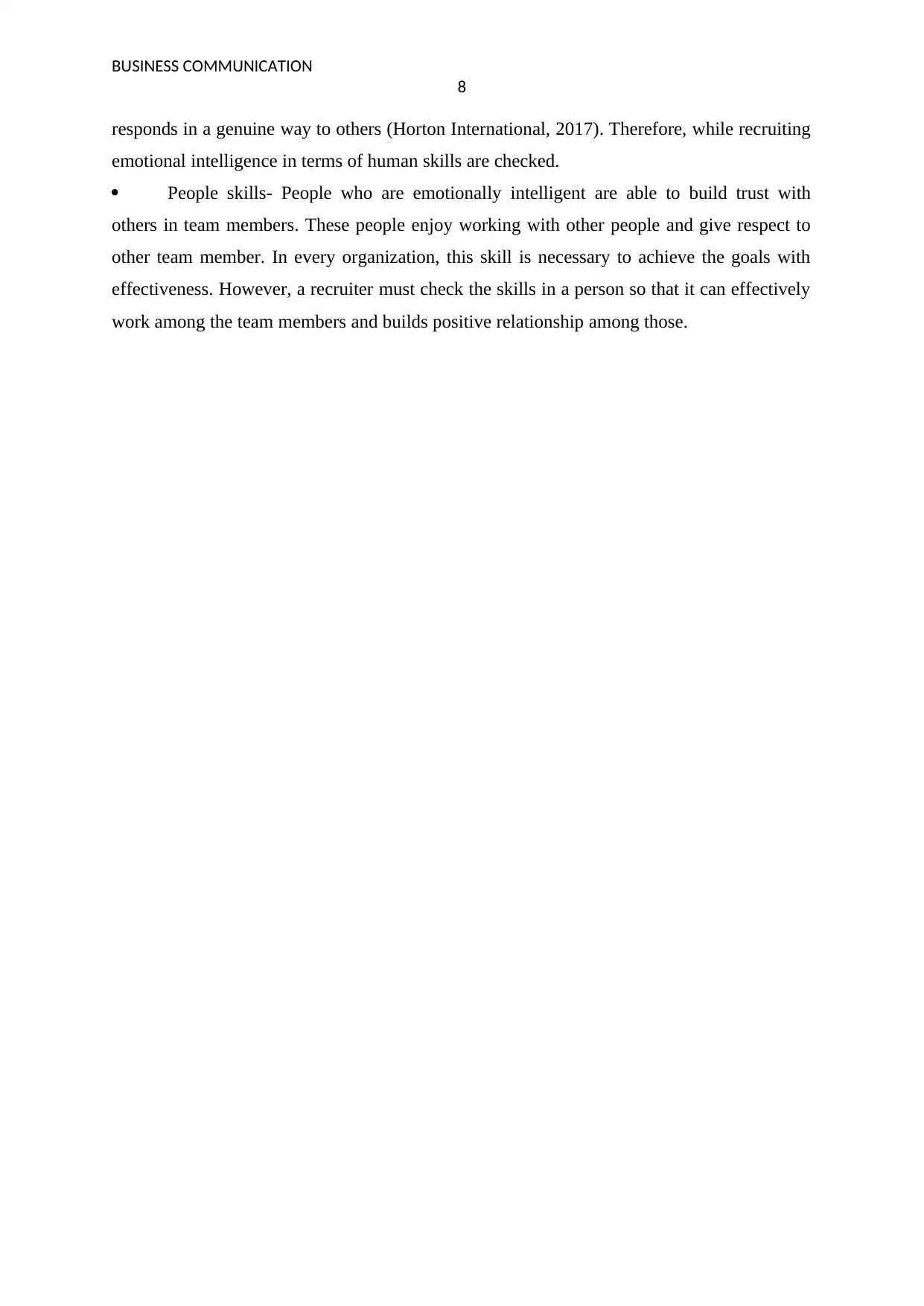
BUSINESS COMMUNICATION
8
responds in a genuine way to others (Horton International, 2017). Therefore, while recruiting
emotional intelligence in terms of human skills are checked.
People skills- People who are emotionally intelligent are able to build trust with
others in team members. These people enjoy working with other people and give respect to
other team member. In every organization, this skill is necessary to achieve the goals with
effectiveness. However, a recruiter must check the skills in a person so that it can effectively
work among the team members and builds positive relationship among those.
8
responds in a genuine way to others (Horton International, 2017). Therefore, while recruiting
emotional intelligence in terms of human skills are checked.
People skills- People who are emotionally intelligent are able to build trust with
others in team members. These people enjoy working with other people and give respect to
other team member. In every organization, this skill is necessary to achieve the goals with
effectiveness. However, a recruiter must check the skills in a person so that it can effectively
work among the team members and builds positive relationship among those.
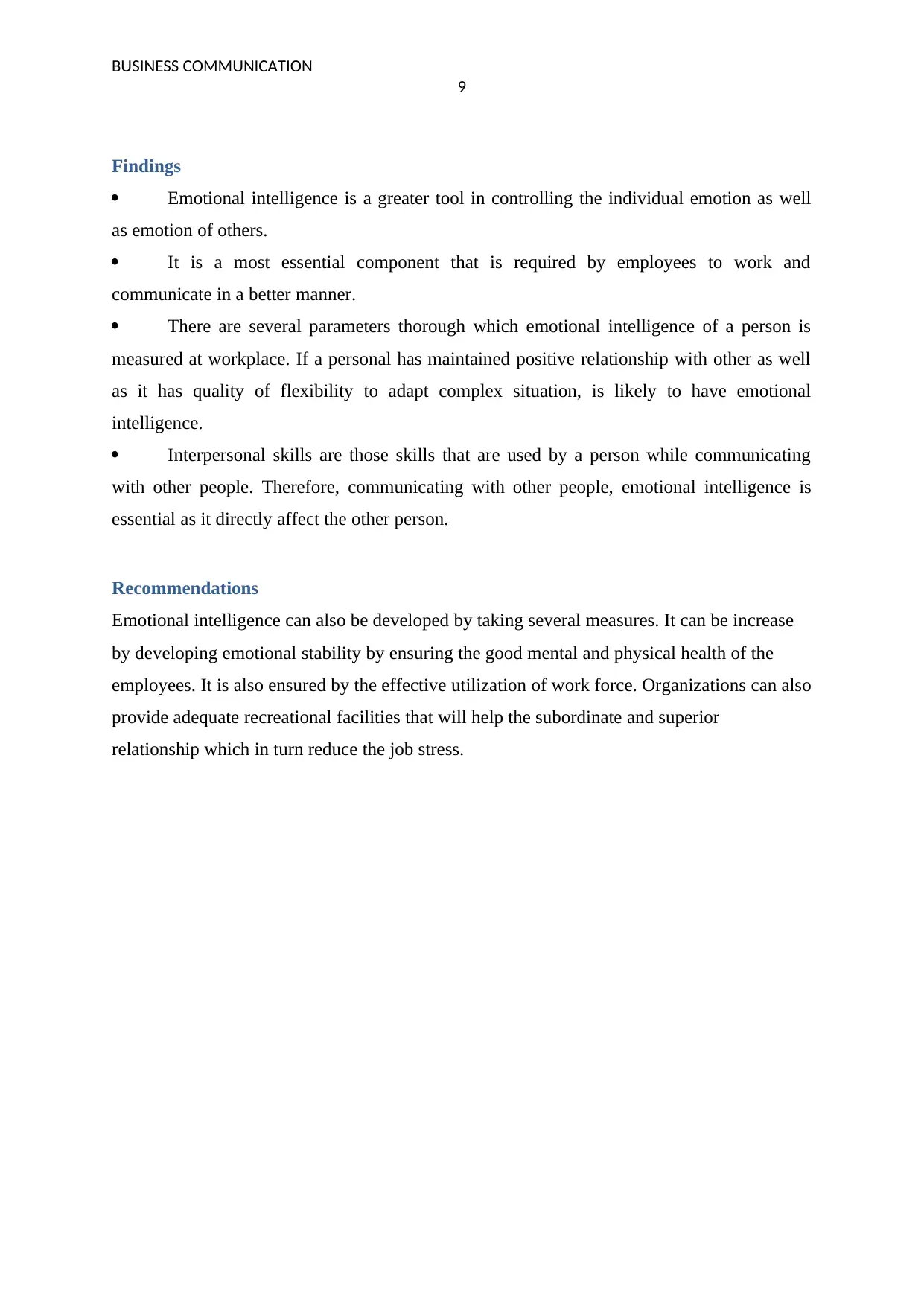
BUSINESS COMMUNICATION
9
Findings
Emotional intelligence is a greater tool in controlling the individual emotion as well
as emotion of others.
It is a most essential component that is required by employees to work and
communicate in a better manner.
There are several parameters thorough which emotional intelligence of a person is
measured at workplace. If a personal has maintained positive relationship with other as well
as it has quality of flexibility to adapt complex situation, is likely to have emotional
intelligence.
Interpersonal skills are those skills that are used by a person while communicating
with other people. Therefore, communicating with other people, emotional intelligence is
essential as it directly affect the other person.
Recommendations
Emotional intelligence can also be developed by taking several measures. It can be increase
by developing emotional stability by ensuring the good mental and physical health of the
employees. It is also ensured by the effective utilization of work force. Organizations can also
provide adequate recreational facilities that will help the subordinate and superior
relationship which in turn reduce the job stress.
9
Findings
Emotional intelligence is a greater tool in controlling the individual emotion as well
as emotion of others.
It is a most essential component that is required by employees to work and
communicate in a better manner.
There are several parameters thorough which emotional intelligence of a person is
measured at workplace. If a personal has maintained positive relationship with other as well
as it has quality of flexibility to adapt complex situation, is likely to have emotional
intelligence.
Interpersonal skills are those skills that are used by a person while communicating
with other people. Therefore, communicating with other people, emotional intelligence is
essential as it directly affect the other person.
Recommendations
Emotional intelligence can also be developed by taking several measures. It can be increase
by developing emotional stability by ensuring the good mental and physical health of the
employees. It is also ensured by the effective utilization of work force. Organizations can also
provide adequate recreational facilities that will help the subordinate and superior
relationship which in turn reduce the job stress.
Secure Best Marks with AI Grader
Need help grading? Try our AI Grader for instant feedback on your assignments.
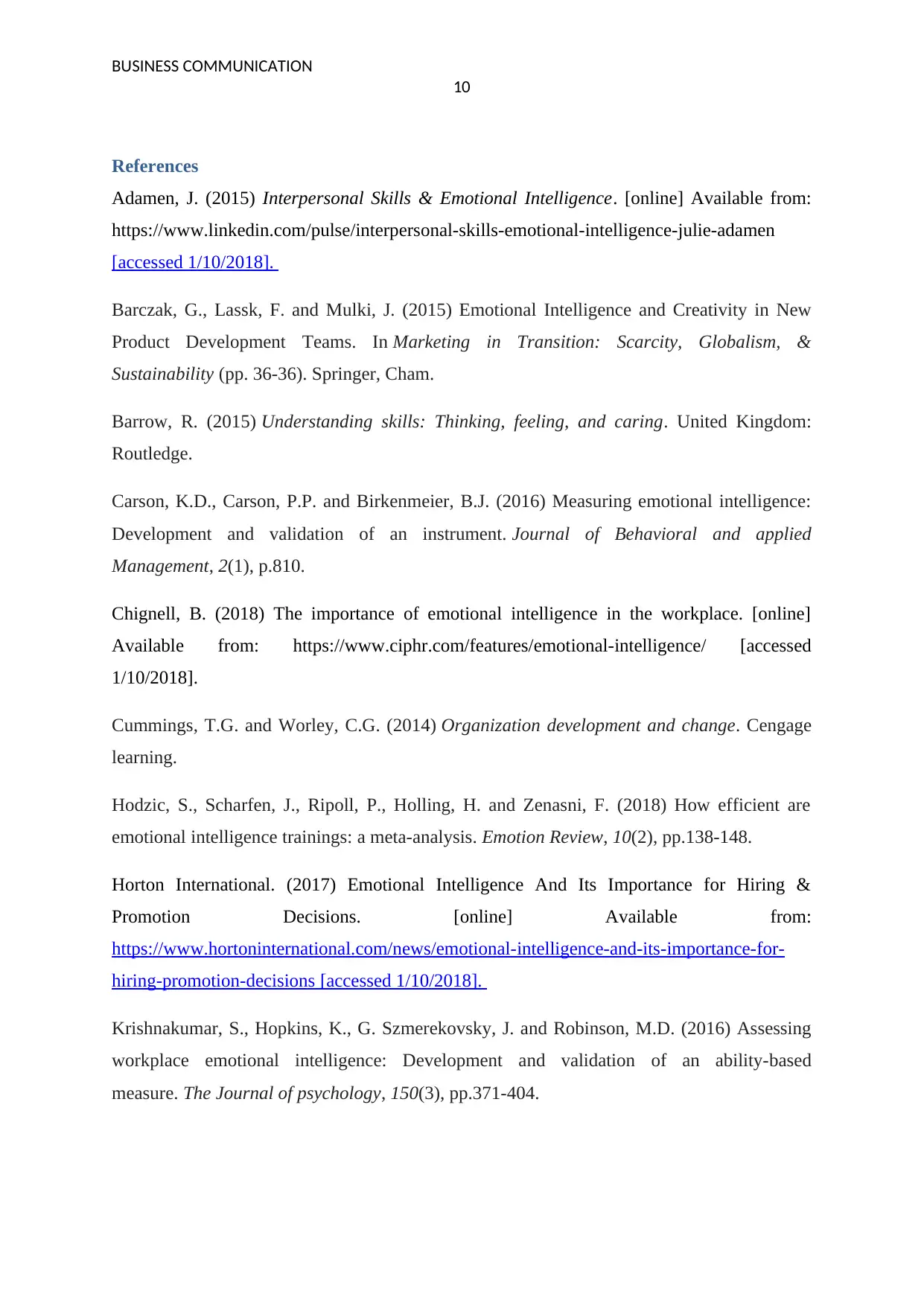
BUSINESS COMMUNICATION
10
References
Adamen, J. (2015) Interpersonal Skills & Emotional Intelligence. [online] Available from:
https://www.linkedin.com/pulse/interpersonal-skills-emotional-intelligence-julie-adamen
[accessed 1/10/2018].
Barczak, G., Lassk, F. and Mulki, J. (2015) Emotional Intelligence and Creativity in New
Product Development Teams. In Marketing in Transition: Scarcity, Globalism, &
Sustainability (pp. 36-36). Springer, Cham.
Barrow, R. (2015) Understanding skills: Thinking, feeling, and caring. United Kingdom:
Routledge.
Carson, K.D., Carson, P.P. and Birkenmeier, B.J. (2016) Measuring emotional intelligence:
Development and validation of an instrument. Journal of Behavioral and applied
Management, 2(1), p.810.
Chignell, B. (2018) The importance of emotional intelligence in the workplace. [online]
Available from: https://www.ciphr.com/features/emotional-intelligence/ [accessed
1/10/2018].
Cummings, T.G. and Worley, C.G. (2014) Organization development and change. Cengage
learning.
Hodzic, S., Scharfen, J., Ripoll, P., Holling, H. and Zenasni, F. (2018) How efficient are
emotional intelligence trainings: a meta-analysis. Emotion Review, 10(2), pp.138-148.
Horton International. (2017) Emotional Intelligence And Its Importance for Hiring &
Promotion Decisions. [online] Available from:
https://www.hortoninternational.com/news/emotional-intelligence-and-its-importance-for-
hiring-promotion-decisions [accessed 1/10/2018].
Krishnakumar, S., Hopkins, K., G. Szmerekovsky, J. and Robinson, M.D. (2016) Assessing
workplace emotional intelligence: Development and validation of an ability-based
measure. The Journal of psychology, 150(3), pp.371-404.
10
References
Adamen, J. (2015) Interpersonal Skills & Emotional Intelligence. [online] Available from:
https://www.linkedin.com/pulse/interpersonal-skills-emotional-intelligence-julie-adamen
[accessed 1/10/2018].
Barczak, G., Lassk, F. and Mulki, J. (2015) Emotional Intelligence and Creativity in New
Product Development Teams. In Marketing in Transition: Scarcity, Globalism, &
Sustainability (pp. 36-36). Springer, Cham.
Barrow, R. (2015) Understanding skills: Thinking, feeling, and caring. United Kingdom:
Routledge.
Carson, K.D., Carson, P.P. and Birkenmeier, B.J. (2016) Measuring emotional intelligence:
Development and validation of an instrument. Journal of Behavioral and applied
Management, 2(1), p.810.
Chignell, B. (2018) The importance of emotional intelligence in the workplace. [online]
Available from: https://www.ciphr.com/features/emotional-intelligence/ [accessed
1/10/2018].
Cummings, T.G. and Worley, C.G. (2014) Organization development and change. Cengage
learning.
Hodzic, S., Scharfen, J., Ripoll, P., Holling, H. and Zenasni, F. (2018) How efficient are
emotional intelligence trainings: a meta-analysis. Emotion Review, 10(2), pp.138-148.
Horton International. (2017) Emotional Intelligence And Its Importance for Hiring &
Promotion Decisions. [online] Available from:
https://www.hortoninternational.com/news/emotional-intelligence-and-its-importance-for-
hiring-promotion-decisions [accessed 1/10/2018].
Krishnakumar, S., Hopkins, K., G. Szmerekovsky, J. and Robinson, M.D. (2016) Assessing
workplace emotional intelligence: Development and validation of an ability-based
measure. The Journal of psychology, 150(3), pp.371-404.
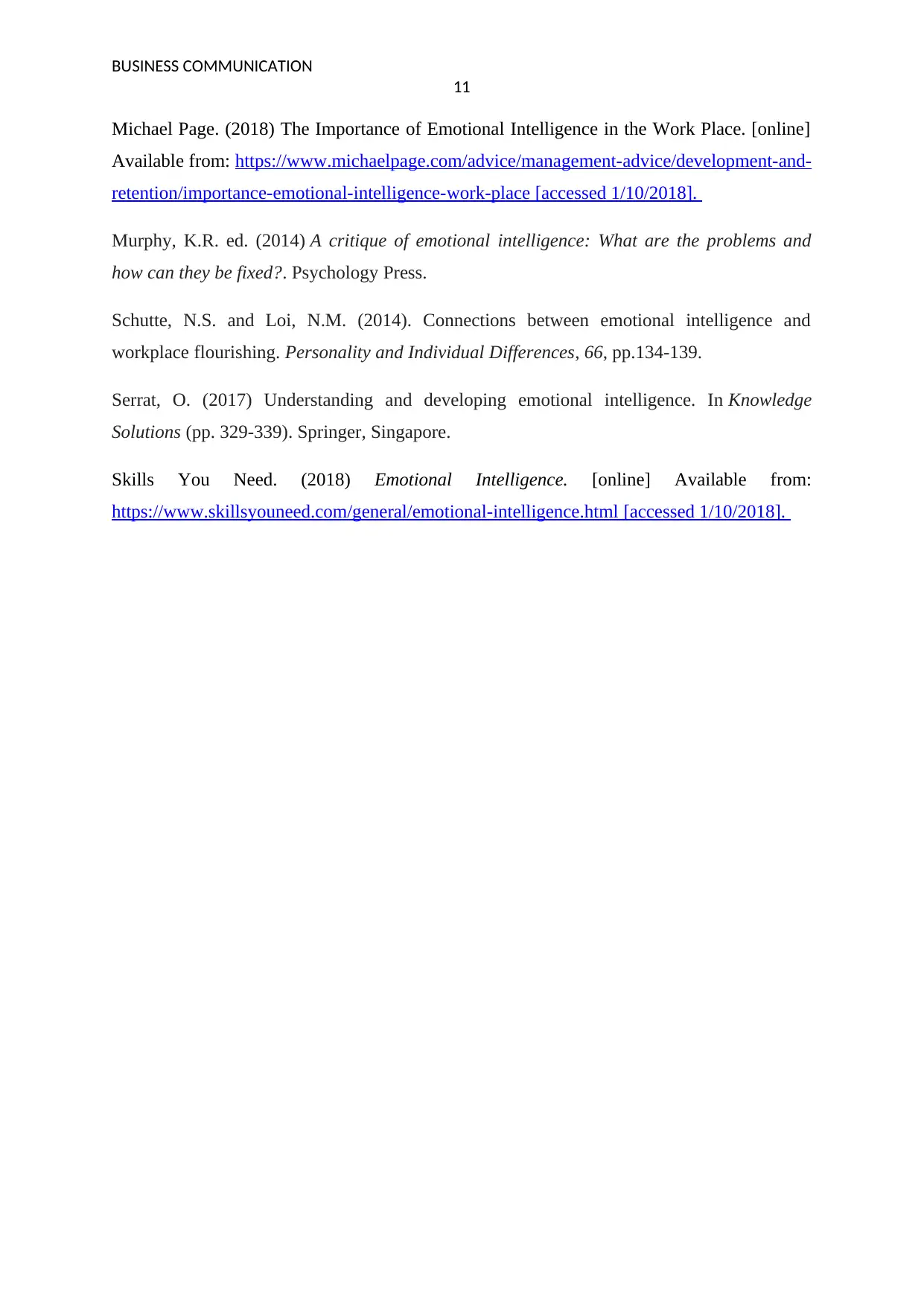
BUSINESS COMMUNICATION
11
Michael Page. (2018) The Importance of Emotional Intelligence in the Work Place. [online]
Available from: https://www.michaelpage.com/advice/management-advice/development-and-
retention/importance-emotional-intelligence-work-place [accessed 1/10/2018].
Murphy, K.R. ed. (2014) A critique of emotional intelligence: What are the problems and
how can they be fixed?. Psychology Press.
Schutte, N.S. and Loi, N.M. (2014). Connections between emotional intelligence and
workplace flourishing. Personality and Individual Differences, 66, pp.134-139.
Serrat, O. (2017) Understanding and developing emotional intelligence. In Knowledge
Solutions (pp. 329-339). Springer, Singapore.
Skills You Need. (2018) Emotional Intelligence. [online] Available from:
https://www.skillsyouneed.com/general/emotional-intelligence.html [accessed 1/10/2018].
11
Michael Page. (2018) The Importance of Emotional Intelligence in the Work Place. [online]
Available from: https://www.michaelpage.com/advice/management-advice/development-and-
retention/importance-emotional-intelligence-work-place [accessed 1/10/2018].
Murphy, K.R. ed. (2014) A critique of emotional intelligence: What are the problems and
how can they be fixed?. Psychology Press.
Schutte, N.S. and Loi, N.M. (2014). Connections between emotional intelligence and
workplace flourishing. Personality and Individual Differences, 66, pp.134-139.
Serrat, O. (2017) Understanding and developing emotional intelligence. In Knowledge
Solutions (pp. 329-339). Springer, Singapore.
Skills You Need. (2018) Emotional Intelligence. [online] Available from:
https://www.skillsyouneed.com/general/emotional-intelligence.html [accessed 1/10/2018].
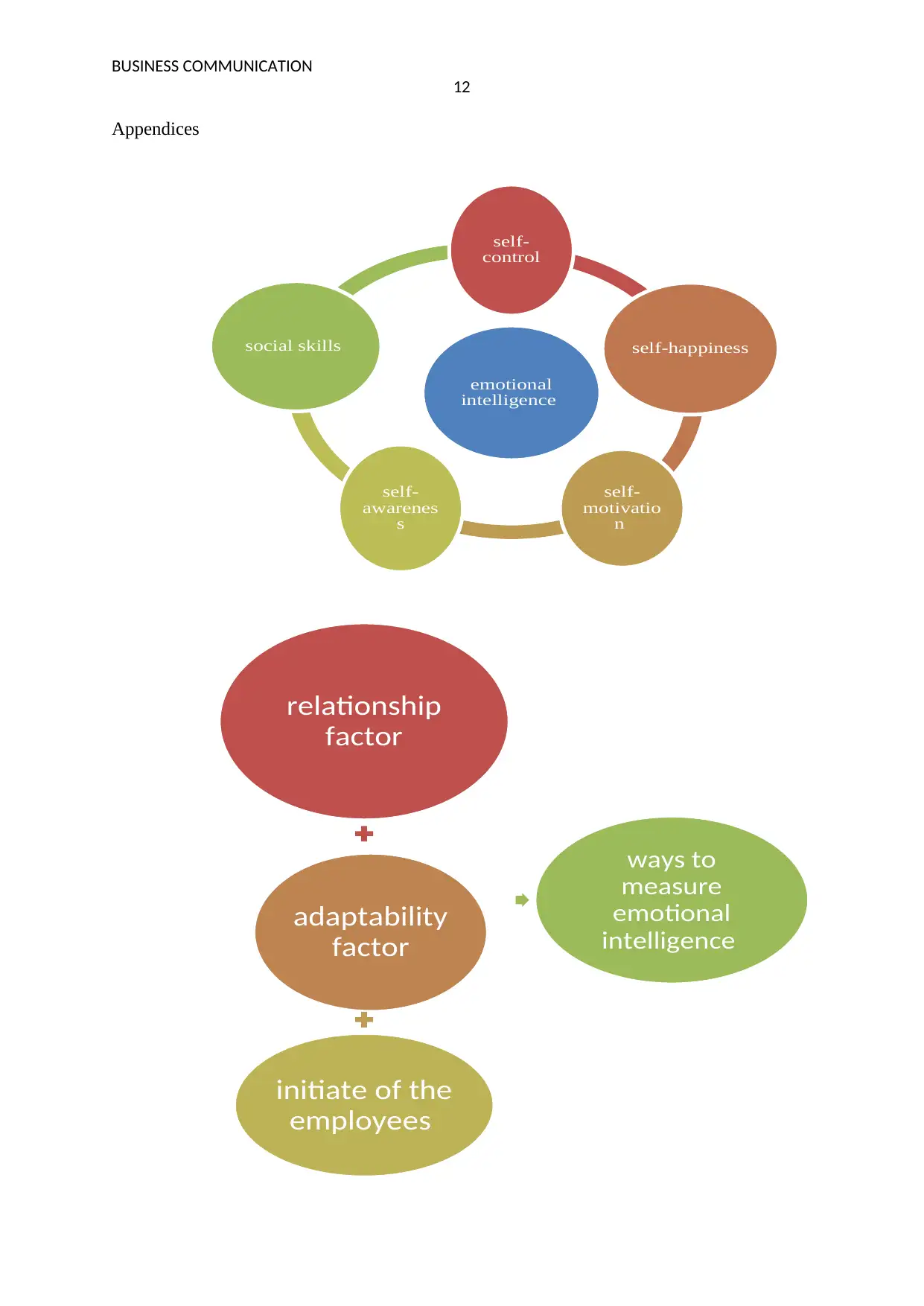
BUSINESS COMMUNICATION
12
Appendices
emotional
intelligence
self-
control
self-happiness
self-
motivatio
n
self-
awarenes
s
social skills
relationship
factor
adaptability
factor
initiate of the
employees
ways to
measure
emotional
intelligence
12
Appendices
emotional
intelligence
self-
control
self-happiness
self-
motivatio
n
self-
awarenes
s
social skills
relationship
factor
adaptability
factor
initiate of the
employees
ways to
measure
emotional
intelligence
Paraphrase This Document
Need a fresh take? Get an instant paraphrase of this document with our AI Paraphraser
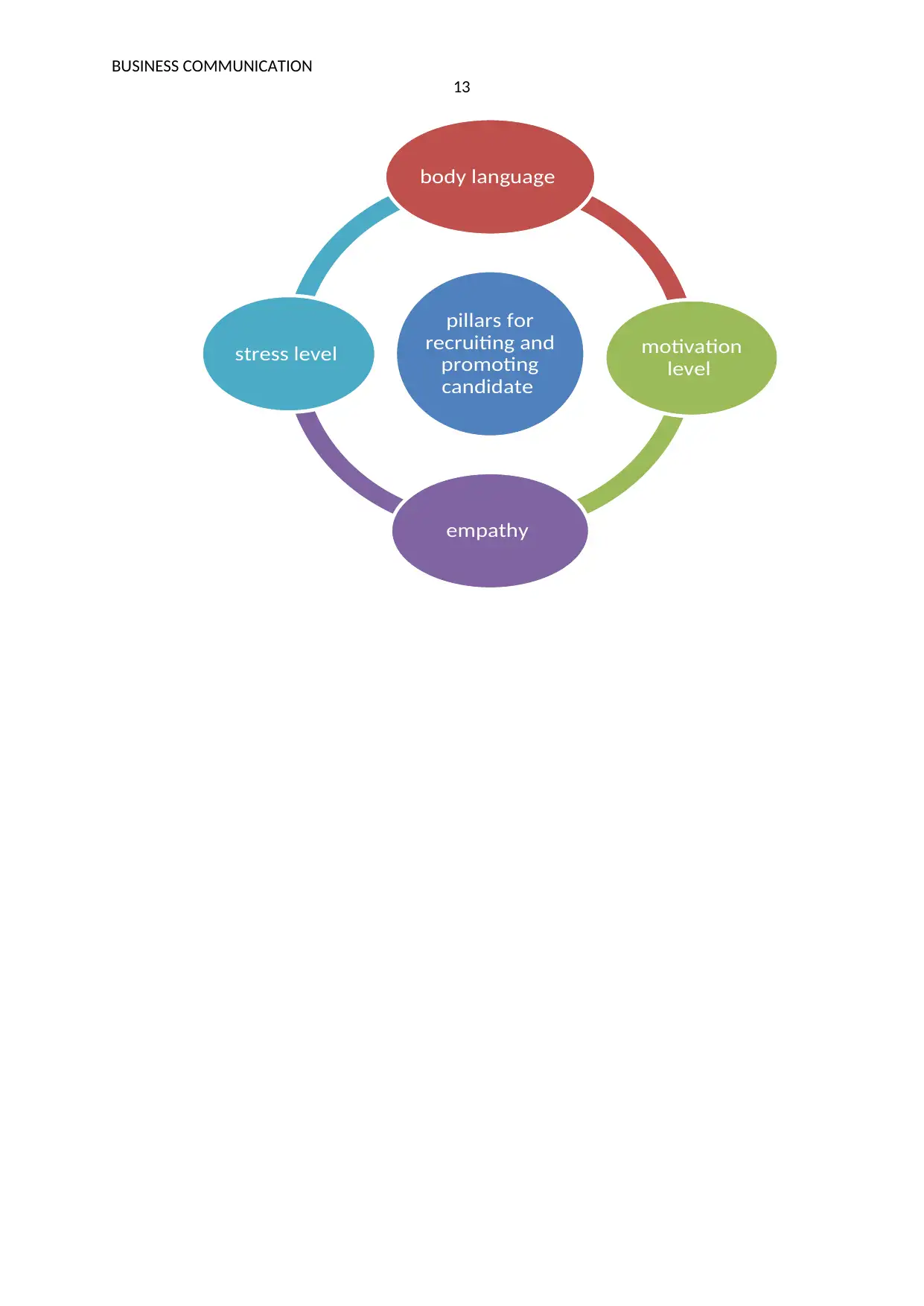
BUSINESS COMMUNICATION
13
pillars for
recruiting and
promoting
candidate
body language
motivation
level
empathy
stress level
13
pillars for
recruiting and
promoting
candidate
body language
motivation
level
empathy
stress level
1 out of 14
Related Documents
Your All-in-One AI-Powered Toolkit for Academic Success.
+13062052269
info@desklib.com
Available 24*7 on WhatsApp / Email
![[object Object]](/_next/static/media/star-bottom.7253800d.svg)
Unlock your academic potential
© 2024 | Zucol Services PVT LTD | All rights reserved.





